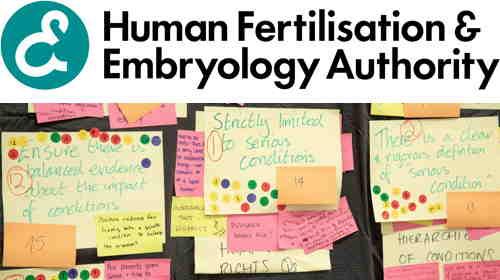The UK Campaign to Legalize Germline Gene Editing

HFEA logo & some post-its from the Citizens Jury
Hundreds of scientists (and a few others) will be in London starting Monday for the three-day Third International Summit on Human Genome Editing. The organizers are conspicuously focusing most of the first two days on gene editing as medicine for sick patients, including the economic problems of million-dollar-plus treatments that are still under development. The third day, however, is all about heritable genome editing – using gene editing on embryos or gametes to engineer the traits of future children. It seems clear that its advocates on the Summit organizing committee, who clearly form a majority, enthusiastically led by the Chair, Robin Lovell-Badge, hope to put previous controversies behind them and detail a path to accepting and legalizing reproductive gene editing.
In this effort, they have some powerful allies, who have weighed in this week.
The UK’s Human Fertilisation and Embryology Authority (HFEA), a quasi-governmental agency that oversees fertility treatments and human embryo research, has just published a “consultation” briefing that officially acknowledges what’s been leaking out over the past few months: that the agency will seek to grab for itself the authority to decide whether the UK will overturn the existing global policy consensus that heritable genome editing should remain off limits.
Of course, they don’t put it like that, exactly. The consultation is an online survey:
Modernising the regulation of fertility treatment and research involving human embryos:
The HFEA is reviewing the law on fertility treatment regulation and embryo research to prioritise recommendations for change. The consultation closes at 5pm on 14th April 2023.
As we have discussed previously (1, 2), HFEA is proposing that they be granted “power to establish regulatory sandboxes, with a lower evidential threshold than is currently required for the full approval of a novel process.” Specifically, on page 26 of 27 of the consultation document (the downloadable version), they note that “interventions in the nuclear DNA of gametes or embryos for use in reproduction” are currently banned by the Act that regulates the HFEA. But:
Amending the Act to specify a principle that in limited instances germline genome editing techniques could be used, subject to further parliamentary approval of regulations setting out principles for what such acceptable uses might be, would be one way forward.
After a quick nod to parliamentary oversight and public debate, the last question in the survey, on the next page, asks blandly:
To what extent do you agree or disagree that changes should be made to the Act to allow Regulations to be made (by secondary legislation or statutory instruments) to enable future amendments and extensions?
The reference to “statutory instruments” is particularly concerning since these are defined as delegating (usually but not always to a government Minister) the ability to make law. In context, this question seems to ask whether the HFEA should be permitted to move ahead to demonstrate heritable gene editing in advance of its legalization by Parliament.
Many respondents, reading through the 25 preceding pages, which describe a wide range of “amendments and extensions,” will not recognize that agreeing on this question is an endorsement of “CRISPR baby” technology. But it’s a reasonable assumption that if the answer comes back “Yes,” it will be interpreted as an endorsement of heritable genome editing.
In this, HFEA has a close ally in the Wellcome Trust, a huge charitable organization that funds research on health issues. Last week Wellcome Connecting Science published the result of their version of a public consultation on heritable genome editing, which took place in September. Wellcome called this process a “citizens’ jury,” by which they mean a group of 21 people affected by genetic diseases whom they selected and briefed, and whose conclusions they describe this way:
Citizens’ jury votes in favour of editing human embryos to treat serious genetic conditions
But based on Wellcome’s own report, this interpretation bears closer scrutiny. Actually, the vote (17–4) was “that the government should consider changing the law” (which is somewhat less definite) and the question discussed (see p. 18 of the report) was: “Are there any circumstances under which a UK Government should consider changing the law to allow intentional genome editing of human embryos for serious genetic conditions?” The Guardian’s Robin McKie opened his report on the jury with a far less equivocal statement: “Ministers must consider changing the law to allow scientists to carry out genome editing of human embryos for serious genetic conditions – as a matter of urgency.” That’s a classic example of interpretation as advocacy.
An even larger majority of the “citizens’ jury” called for “guarantees of equity & diversity in decision making” and a number of other sensible preconditions. The people involved did have some sophisticated discussions, for instance about the fact that an embryo cannot give consent. In their discussions of heritable genome editing, they were asked to make the more than questionable assumption that the technology would be safe and effective.
Finally, note that the publications by HFEA and The Wellcome Trust both seem remarkably well timed to coincide with the Summit. Why, you could even call it a campaign.



